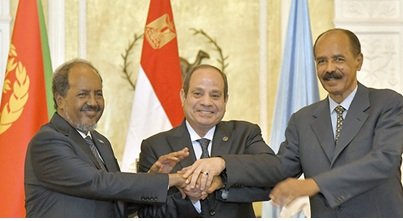Mogadishu (WDN)- The diplomatic landscape in the Horn of Africa has shifted dramatically since January 2024, when Ethiopia signed a controversial Memorandum of Understanding (MoU) with Somaliland, granting Addis Ababa access to the Red Sea and permission to establish a naval base. The deal, seen by the Federal Government of Somalia as a blatant violation of its sovereignty, sparked fierce condemnation from Mogadishu and intensified regional tensions.
In response, Somalia began strengthening ties with Egypt—another country with mounting strategic friction with Ethiopia, particularly over the Grand Ethiopian Renaissance Dam (GERD) and control of Nile River waters. Egypt and Somalia’s alignment quickly took on a military dimension, with Cairo pledging to provide training and equipment to the Somali National Army. Discussions even emerged about Egypt joining the African Union peacekeeping mission in Somalia, signaling a deepening partnership grounded in mutual opposition to Ethiopian ambitions. Eritrea has also provided military training to Somalia National Army.
This growing cooperation was formalized in October 2024, when Egypt, Eritrea, and Somalia signed a tripartite defense agreement during a high-level summit in Asmara. The pact aimed at bolstering regional security and counterbalancing Ethiopian influence, especially in the strategically sensitive Greater Red Sea region.
However, diplomatic winds shifted again when Turkey stepped in as a mediator between Somalia and Ethiopia. The Turkish-brokered talks culminated in a meeting between Somali President Hassan Sheikh Mohamud and Ethiopian Prime Minister Abiy Ahmed in Ankara on December 12, 2024. The two leaders signed a preliminary agreement and exchanged reciprocal state visits, signaling a tentative thaw in relations.
President Hassan’s efforts to strike a balance between Addis Ababa and Cairo have since drawn rebuke, particularly from Egypt and Eritrea, who view his rapprochement with Ethiopia as a strategic miscalculation. What began as a bold bid for regional diplomacy now appears to be straining Somalia’s previously solid ties with Cairo and Asmara.
Signs of diplomatic fallout have become more evident in recent months. Notably, Egyptian President Abdel Fattah el-Sisi’s high-profile visit to Djibouti—Somalia’s neighbor and strategic partner—has been interpreted by many analysts as a signal of cooling relations between Egypt and Somalia.
The consequences of President Hassan’s strategic balancing act are becoming increasingly apparent. Somalia now risks alienating key regional allies at a time when internal security challenges and economic recovery demand robust external support. The cooling of relations with Egypt and Eritrea could jeopardize military assistance, intelligence cooperation, and broader diplomatic backing at international forums, including the Arab League and African Union.
Furthermore, Somalia’s perceived inconsistency may erode trust among partners and embolden adversaries, including extremist groups that thrive on political instability. Unless recalibrated, President Hassan’s approach may leave Somalia diplomatically isolated and more vulnerable in an already volatile geopolitical landscape. With fault lines deepening and allegiances shifting, the Horn of Africa remains a volatile theater of geopolitical maneuvering.
WardheerNews


Leave a Reply